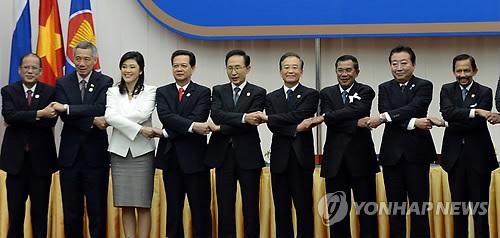South Korea was to declare the opening of two sets of ambitious negotiations toward potentially massive free trade deals Tuesday, which if realized, would create huge new markets in Northeast Asia and the Asia-Pacific region.
The two negotiating processes, one of them between South Korea, China and Japan, and the other involving 16 Asia-Pacific countries, are the most tangible outcomes of a series of annual summits in Cambodia led by the Association of Southeast Asian Nations (ASEAN).
 |
South Korean President Lee Myung-bak and other leaders attending the East Asia Summit, an 18-nation forum grouping the 10 ASEAN nations plus its six dialogue partners, plan to issue a joint statement to declare the launch of negotiations to forge what is dubbed the "Regional Comprehensive Economic Partnership" or RCEP.
The EAS forum also involves South Korea, China, Japan, the United States, Russia, Australia, India, and New Zealand. All but the U.S. and Russia plan to commit to taking part in the negotiations aimed at lowering barriers to trade and promoting a freer flow of goods and services.
The 16 countries have a combined gross domestic product (GDP) of US$19.7 trillion won, and their trade volume reaches $10.1 trillion with their combined population amounting to some 3.4 billion, according to the Korea Institute for International Economic Policy (KIEP).
The regional free trade pact would bring about up to $19.46 billion worth of economic benefits to South Korea, and raise the country's economic growth by 1.76 percent in 10 years after the deal takes effect. The projection is based on the assumption that tariffs on all products, excluding rice, are removed.
Shortly before that, the trade ministers of South Korea, China and Japan plan to meet to officially open separate talks toward a three-way free trade pact between three of Asia's biggest economies.
In May, the three Asian economic powers agreed to launch talks within this year toward a free trade deal. However, the prospect of negotiations was later thrown into doubt when territorial and sovereignty spats flared anew among the three historical rivals.
The ambitious three-way pact, if realized, would create one of the world's largest markets as South Korea, China and Japan account for 20 percent of the global gross domestic product (GDP), 17.5 percent of all global trade and 22 percent of the global population.
Officials said the deal would add 1.45 percent to South Korea's economic growth in 10 years.
This week's declaration is a sign that the three countries intend to move cooperation forward despite the territorial and sovereignty rows. The plan to have the trade ministers make the declaration, rather than the leaders, however, shows tensions still weigh heavily on their ties.
Relations between Seoul and Tokyo have sunken to a record low as Tokyo renewed its claims to South Korea's easternmost islets of Dokdo after President Lee made an unprecedented visit to the East Sea islets in August.
Japan has experienced a similar row with China over a group of East China Sea islets.
Lee and Chinese Premier Wen Jiabao held one-on-one talks Monday, but they have shunned bilateral meetings with Japan due apparently to the tensions. The three countries also skipped a trilateral summit that they had regularly held on the sidelines of ASEAN summits.
"In addition to economic effects, the Korea-China-Japan FTA would institutionalize economic cooperation among the three Northeast Asian nations so as to minimize the negative effects political variables have on economic relations," Deputy Trade Minister Choi Kyung-lim said.
����������������������������������������������������������������������������������������������������������������������������������










